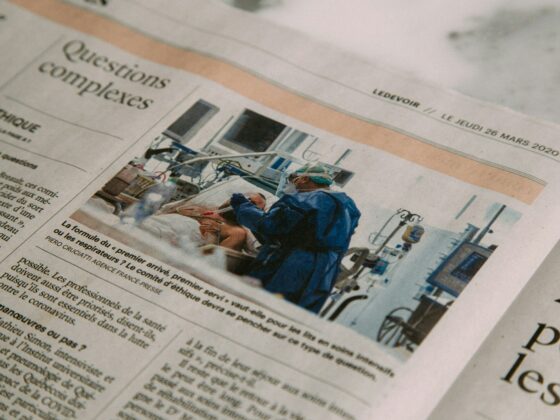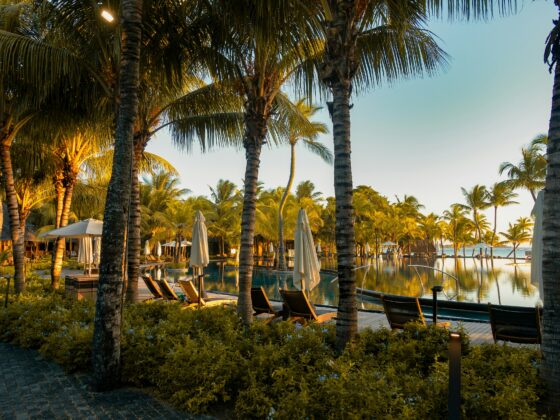Josiah: Can you tell us a little bit about the story of founding Saira Hospitality? I love this notion of challenging norms. You see a better way to do things. You work in hospitality. You work in real estate. And what was that moment that led you to decide there’s an opportunity here to create a new form of education?
Harsha: That was a really key moment when a girlfriend of mine from high school came to visit me in Singapore when I was living there and working at Six Senses. She and I had taken a road trip kind of within Cambodia and we’re sitting in the gas station and it’s like midnight and her and I are just realizing how stupid we are to be sitting as two girls alone in a gas station in Cambodia, you know, in kind of the capital of sex trafficking. And that was a moment because previously that day, I had said to her, I want to check out this nonprofit called Sala Bai. And Sala Bai was taking women from sex trafficking and bringing them into hospitality by training them how to be housekeepers. And it was a traditional form of nonprofit in the sense that they were relying on donations. They didn’t think to ask hotels, I don’t believe. They didn’t think hotels would ever agree to pay for the talent that they were receiving. So they had to continuously rely on donations and think about how we fundraise and make money, which is the challenge. But that was the moment when I thought, wow, this nonprofit is incredible. Because it was an amazing experience just dining there, it was the best food we had, the best service. And then the story behind it was so much deeper and richer than anywhere else we had eaten or seen all through Cambodia. Not that we were doing a nonprofit tour; we’d gone as tourists and just kind of traveling and exploring. And that was a moment where I said, ah, finally, like these two worlds are connected. I’m not quite sure if we’re going to make it out of this gas station alive, but if we do, there’s something there. to explore deeper. And then I took that idea and I applied to Cornell’s Hotel School because I knew that I wanted to develop a business plan around that. I just didn’t know how. And I just didn’t know exactly what it was going to be. But I was lucky to get accepted. And when I got there, I had an idea. I wanted to take all the entrepreneurship classes, and I knew that I needed to go to Cornell. It’s not that I needed to go to Cornell to become an entrepreneur, but I needed people to take me seriously. And now, with that, I think it’s opened a lot of doors. Not only was it a fantastic year and a fantastic school, but it was also saying to people, you know, maybe it was even that it allowed others to take me seriously. Maybe I started taking myself seriously at that point because I realized that I had to do something a little bit more serious than you know, sell my list to ultra-high net worth individuals.

Josiah: Well, it’s so fascinating. So you take these classes, you create a business plan, you know, while at Cornell. Can you describe what the original concept was as you were articulating it then? And then I’d love to hear how you describe what Saira Hospitality is today.
Harsha: Well, yeah, so today we’re a nonprofit that partners with hospitality companies, and we create pop-up and permanent schools all around the world. and giving local communities who have been often overlooked not only the knowledge and the skills but mostly the confidence then be able to be placed into jobs and employment at our partner hotels upon graduating from our schools. That’s what we do today. Similar and not similar in the sense that when I wrote the business plan, it was based on more of a permanent school. So it wasn’t pop-up hotel schools or semi-permanent schools. It was one school that hotels would similarly fund. And we’re now branching out from just hotels. But at that point, it was funded by hotels primarily, who would become partners of this kind of collective and become members, and be able to fund the school collectively and to be able to place the students. So a similar model, it was actually a model that we came across a couple of years ago. So I started Saira in 2015 in downtown LA as a pilot, and it was only two years ago when Greg our COO came on that we came back to this idea of a collective model and multiple hotels coming together in this in this case in the u.k. to find the schools but the prior. I guess, 6 years or 5 years, we were mostly focused on just pop-up hotel schools where a hotel is opening in a certain location. And they are firstly wondering how they’re going to find the talent because often in remote locations, it’s a question as to, are we going to fly in? Are we going to poach talent? And also, more and more, I would say, as the years have gone by, hotels are asking them, how are we going to connect with the local community? How are we going to get their buy-in? How are we going to show that we’re a brand that cares about, you know, the social part of ESG? And so that model still exists. And then we’ve expanded into this more kind of semi-permanent model with collective hotels and hospitality companies, I should say, coming in to fund the schools.
Josiah: So interesting. I love hearing about that journey from the pilot to, you know, what you’ve learned and seen along the journey to today. I’m curious on the educational piece of it. I think going to Cornell, you know, one of, if not the best hotel schools in the world. And then, you know, you’ve seen the industry from a lot of different perspectives. What did you see either back then or along the journey with regards to hospitality education that you felt was broken and needed a fresh perspective and another way of teaching the next generation of hospitality providers?
Harsha: Yeah, it’s so interesting, isn’t it? Because I’m actually not very academic. And then I hear you talk about it. I’m like, I did go to Cornell and I am doing sports. But yeah, I dropped out of university, the first one anyway. So what did I see? So I saw, I didn’t think to myself, oh, I’ve got to create. a school. More than that, I saw the need, right? So I was actually doing an externship at Cornell in Sri Lanka at the Amman in Galle, which is a really lovely externship. So leaving Ithaca, New York, and going to Sri Lanka was great. It wasn’t so much that I thought, oh, let me create schools. It was more like I saw on the hotel side, an Italian general manager who was a really lovely guy and he was struggling to find local talent. and he wanted to build a position for the pool cleaner. And then I saw a lot of development happening in Galle, and I saw a lot of people kind of sitting on the sidelines, you know, watching the hotels being built, not really sure, as so often all over the world, I think, not really sure if they have a place for themselves in there if they could even walk in. Could they take a look? Could they get a job? These aren’t questions, I think, that a lot of local communities who are often overlooked think to themselves as the hotel walls go up, because they’re actual walls, right, that are now dividing you between who comes into the hotel and who comes out of the hotel. So I think that’s what a lot of local communities see. And so this gentleman had walked into the Amman, and he was great. He had a great smile. I would totally have fired him. You know, he was on time, he was well-dressed, you know, in a sense like he was wearing a clean shirt. I overheard the interview because I was working outside the general manager’s office, and I could see how much the general manager really wanted to hire him, but he was answering the questions all wrong. And it was so obvious because any of us, you know, who have been lucky to have any kind of interview skills training would know that if someone says, you know, what do you like to do? And they say, oh, I like to play football. Do you want to play football or do you want to work in the hotel? Well, I want to play football. Of course, you want to play football. Why would you ask that? And how would you know just not to answer so truthfully? Now we know. What is your strength? Oh, I’m too attention to detail. We’re trained how to answer these questions or how to bullshit your way through these questions. And so that’s what we do, we teach people how to wash it. No, but we, I saw the need, I saw the need on on the hotel side. And I saw the need on the community side. And you think I didn’t get the job, which was a shame but understandable. But that’s when I thought how easy it would have been for me to sit down with this guy for two hours and kind of it would be a win-win. And so that was the concept when I was in December in 2013. In 2014, we had a business plan competition. And so that was what I really took to the business plan classes going forward is this is a solution for both sides of the coin. And we started creating these schools. But as I started to create this curriculum for downtown LA, I started to think, well, let’s Let me not write a curriculum based on what I learned at Cornell. Let me write a curriculum based on what these people need to get these jobs. And how do we find what they need? Well, then you go to the employers and you say, well, what do you want them to learn? And they said, oh, we need them to have attention to detail. We need them to have emotional intelligence. They need to be able to communicate. They need leadership. And so I just took all of that research and created my own curriculum, which thank God has been improved and advanced over the last eight years from just what I researched, you know, what I thought. We now have eight global curriculum directors who have amazing experience and passion and knowledge to share. But at that time, and that’s really still the core of the curriculum, is focused on what do these hotel employers and operators want to be able to hire. And more than anything, people want the hospitality gene, and they want to see that this person has the desire to serve, and the ability to serve, and sees the pride in service, right? And so that’s what we do. We find these students who have this gene. We give them as much knowledge as we can possibly give them in normally six weeks. And then we pass them on to the hotels and say, here you go. Here’s the talent that we believe would be great for your brand. And these are the positions that they can fill. And best of luck. We kind of go from there.
Josiah: There are a few things that stand out to hearing you describe this, and one is the effort you put in to understand what are the real problems in the industry, right? Talking to people, hearing, and I think for people that are maybe not exposed to the work that you do, if you think education, it might seem, okay, you’re trying to create another Cornell. And what I’m hearing from you is there is a whole cohort of people that could be great in hospitality. Hospitality could be really good for them, but they just haven’t understood what that could be, or there’s some barriers they don’t know how to communicate in a way that’s going to get them in the door and started on that journey, right? And so you’re helping this whole cohort of people, you know, get at the door and get started. You also mentioned something about service. I wondered if we could unpack a little bit more because in I’ve heard you speak before and conversations I’ve had around this, around the world, there can be a hesitation to work in hospitality because the notion of it being servitude as opposed to service. I’m curious what you think about that distinction and what you found effective in communicating the difference for this for people who may not even start a conversation about what hospitality could do for them because this is a barrier. How do you describe that difference?
Harsha: What is the difference between service and servitude? We first came across this in the British Virgin Islands. I think it was the most apparent in the British Virgin Islands. And we couldn’t understand why no one wanted to take this hospitality school that was being funded by a group of hotels after the hurricanes. And a lot of people had lost their jobs and this seemed so obvious to us, like, why don’t they want to take this school where at the end of it, they get jobs and hospitality. And that’s when we started unpacking it a lot more and realized that they were seeing service as servitude. And so that’s when we had to do almost like a PR campaign for hospitality. But more than that, it was understanding from them where it’s coming from and, you know, what they had been conditioned to think and what they had been conditioned to believe about both the industry and about themselves. And a lot of their parents and generations from the past had said, Oh, well, I’m going to work in hospitality so that you don’t have to, so that you can go get a job in an air-conditioned office and you can be a manager. And so everyone we were speaking to was like, I just want to be a manager. I was like, do you? Because you seem so fun. And she seems so like lively and you got a great smile. And you know, they would laugh and you’d have to go a little deeper and say, well, you know, what does a manager do? What is it that you want to, why do you want to be a manager? And they’d say, well, I want to sit in the office and I want to And they didn’t really have more than that. They wanted to lead people, which is a great aspiration. But you know, did they realize that they also wanted to work potentially in hotels to work around people and managers don’t get to see a lot of the guests and they don’t get to interact and they don’t get a lot of the tips. And they don’t and you know, you have to start re educating, I think a lot of people are a lot of potential talent about The beauty of service and honestly it isn’t it isn’t for everyone though you know and i think if that is really what is calling you just to sit in an office which it probably isn’t it’s probably something you haven’t tried yet and when you do you realize how not fun it is to just take zoom calls all day and get sciatica from just sitting down all the time. But you got to try it to know that. But so I think when we managed to really break it down for people as to what the industry is about, I think it started with introducing them to what the hotels feel like, what do they look like? What do they taste like in the sense of let’s do a fine dining experience our students where they can actually be in the role of the guest and they can actually experience what high service feels like and what a plate that’s beautifully designed looks like and this is stuff they’ve never had. So while these students and potential students lived on these islands surrounded by the world’s best hotels you know all these different collections, they never been to these hotels inside they never been able to get on the boat to these hotels and resorts I should say islands so a lot of our education that was more like come and see what the industry is about. Come and taste it. Come and jump in the pool. Come and check out the beach. Come and see the guest rooms. Come and see what we’re selling here and what we’re interacting with. This becomes your whole stage, this hotel. You’re not serving the white man. This is your new home. I remember when I used to work at The Fullerton Hotel in Singapore, and a friend came to see me and she’s like, I’m like, you look so comfortable. I’m like, I’m so comfortable. I just love this place. It was very uncomfortable, actually, because they had made me wear stockings and red lipstick and pearl earrings, and it was a whole weird look for me. But I was very comfortable in that environment just because it felt so fun to me to come to work and pick up my uniform. And it was really like an actress. And I would smile and talk to people all day. And the hotel was like, this is great. And the fact that I was getting paid to just walk around talking to people all day and I’m trying to serve badly but getting away with it because they people like me because I was smiling and I was fine and I found it fun and, even though I gave them the wrong food at the wrong time in the wrong dish that’s where I learned that seventy percent of an experience emotional so I tell the students you can fuck up, but make friends with these people so they don’t hate you when you serve them the wrong dish or you know because they’ll come back they’ll give you a pass but if you’re not nice and you don’t enjoy serving them, and they can tell that, and then you mess up their meal well then they’re never coming back and you’re not very good.
Josiah: I love this example so much of inviting people. It sounds like early on the process where as part, you’re almost selling this as a career, and it’s not, okay, we’re going to make you go through this whole process. And if you make it through all these hoops that you’re jumping through, then maybe you get to step foot on property. I would love to see more hospitality providers take this proactive approach, invite people, experience this as a, I guess you can be a part of this incredible experience that is probably fun to participate in, but you got to show people, people have to feel that you can’t just, Show them a brochure or tell them that. You have to feel it. So I love that people talk about being proactive in selling the career. Not as many do this as should. And so I really appreciate, you know, kind of an invitation to that.
Harsha: You know, it’s changed so much. So now we have this Immersion Day, especially in the UK after Brexit and the pandemic, so no one could find any talent, which is fair enough, right? You let everyone go very quickly after years of service. And so there’s a lot of career changes and struggles to find talent. And so now when we do our schools, our partners are there, like you’re saying, right? They’re feeling it, so they’re on the ground; they’re in the Immersion Day, which is one of our interview steps. And so while the students are being interviewed by us, by the Syra team, the hotels are selling themselves, because they know that the students are going to ultimately pick which hotels. At this point, I think the students have been to two or three rounds of interviews. So they’re going to pick which hotels they want to work at. So the hotels are actively saying, you know, these are our values. We’ve seen them bring in like pens and hats. You know, stuff that works, in all honesty. They’re saying, you know, come and check out our hotel. And it’s switched a lot, I would say, from what it was before, where the hotel is the one interviewing the talent. It’s gone the other way, especially in our schools. The talent is really interviewing these different brand partners to say, which one do I want to work in? Knowing that they’ll probably have a choice at the end of the day because they’re all looking to hire. So I think it’s changed a lot in some areas.
Josiah: It’s changed. And there’s so much opportunity for change. I feel like what you and your team at Saira are doing at the forefront of that change. I love the mission. I love the, you know, track record; the results speak for themselves. I’ll link in the show notes where people can learn more about Saira. I really encourage people to click in there and learn a little bit more.






